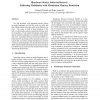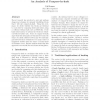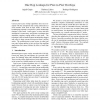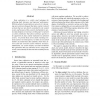146
click to vote
HOTOS
2003
IEEE
15 years 7 months ago
2003
IEEE
—Traditional hierarchical namespaces are not sufficient for representing and managing the rich semantics of today’s storage systems. In this paper, we discuss the principles o...
143
click to vote
HOTOS
2003
IEEE
15 years 7 months ago
2003
IEEE
Two big problems with operating systems written in unsafe languages are that they crash too often and that adding features becomes much more difficult over time. One cause of bot...
116
click to vote
HOTOS
2003
IEEE
15 years 7 months ago
2003
IEEE
Distributed writable storage systems typically provide NFS-like semantics and unbounded persistence for files. We claim that for planetary-scale distributed services such facilit...
HOTOS
2003
IEEE
15 years 7 months ago
2003
IEEE
Execution of a program almost always involves multiple address spaces, possibly across separate machines. Here, an approach to reducing such costs using compiler optimization tech...
HOTOS
2003
IEEE
15 years 7 months ago
2003
IEEE
This paper describes the vision of the Collective, a compute utility which runs internet services as well as the highly interactive applications we run on desktop computers today....
HOTOS
2003
IEEE
15 years 7 months ago
2003
IEEE
Recent research has produced a new and perhaps dangerous technique for uniquely identifying blocks that I will call compare-by-hash. Using this technique, we decide whether two bl...
120
click to vote
HOTOS
2003
IEEE
15 years 7 months ago
2003
IEEE
Many types of information available in a pervasive computing environment, such as people location information, should be accessible only by a limited set of people. Some propertie...
HOTOS
2003
IEEE
15 years 7 months ago
2003
IEEE
Current peer-to-peer lookup algorithms have been designed with the assumption that routing information at each member node must be kept small, so that the bookkeeping required to ...
115
click to vote
HOTOS
2003
IEEE
15 years 7 months ago
2003
IEEE
Data replication is a widely used technique for achieving fault tolerance and improved performance. With the advent of content delivery networks, it is becoming more and more freq...
117
click to vote
HOTOS
2003
IEEE
15 years 7 months ago
2003
IEEE
Advances in sensor networking and location tracking technology enable location-based applications but they also create significant privacy risks. Privacy is typically addressed t...




